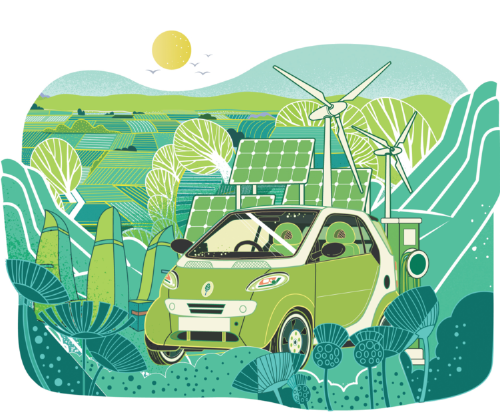
Sustainable progress ahead - 2024-07-18
 Azerbaijan, which will host COP29 in November, is seeking to attract investment in renewable energy and green technology to diversify its economy away from oil and gas.
Azerbaijan, which will host COP29 in November, is seeking to attract investment in renewable energy and green technology to diversify its economy away from oil and gas.The Joint Declaration of the Republic of Azerbaijan and the People's Republic of China on the Establishment of a Strategic Partnership adopted on July 3 within the framework of the Astana Summit of the Shanghai Cooperation Organization is expected to open new opportunities for bilateral relations in a wide range of sectors, including renewable energy and green technology.
Azerbaijan is committed to reducing greenhouse gas emissions by 35 percent by 2030, compared to 1990 levels. Renewables offer the most promising low-carbon solution to meet the country's targets and its installed new energy generation capacity is set to reach 30 percent of the national total by the end of the decade.
Accelerating the use of renewable energy has become a key component of Azerbaijan's energy and foreign policy in recent years. In the context of its enhanced international cooperation to foster the country's green energy transition, Azerbaijan has strengthened ties with global energy companies such as ACWA Power, BP, TEPSCO and Masdar.
Chinese energy companies have been increasingly active in Azerbaijan in recent years. For instance, a memorandum of understanding was signed in 2023 between Azerbaijan's Energy Ministry and China Gezhouba Group Overseas Investment on the implementation of renewable energy projects with capacity of 2 gigawatts. Moreover, China is leading the electric vehicle market in Azerbaijan. The Azerbaijani government will purchase 200 electric buses (to be locally assembled) from BYD each year between 2025 and 2028, but some buses will begin their service during the upcoming COP29.
This November, the 29th Conference of the Parties to the United Nations Framework Convention for Climate Change will be held in Baku, capital of Azerbaijan, in the South Caucasus region. This comes as an important acknowledgement of the status that the country has acquired within the international community, of its relevance in the global energy market and more broadly of its role in the modern quest for decarbonization.
Just like it initially happened with Dubai's COP28, entrusting a major oil and gas producer like Azerbaijan with the responsibility of organizing such a significant climate change gathering has been accompanied, in some circles, by concerns and criticisms.
It is also worth noting that the COP can significantly contribute to the diversification of the local economy: Azerbaijan, in fact, like many other oil exporting nations is in dire need of economic diversification and is therefore interested in attracting investment in technologies and sustainable industries which may be fundamental for the country's long-term stability and prosperity. To this end, tourism is one of the priority sectors in Azerbaijan's non-oil economy, and hosting international events such as COP29 can contribute significantly to infrastructure development, showcase the country's attractiveness as a tourism destination and foster socio-economic mobility and inclusion.
The event may also serve as a catalyst for capacity building and knowledge sharing necessary to tackle the dramatic environmental challenges that Azerbaijan, like many other developing countries in the world, are faced with.
In fact, directly engaging oil and gas producing countries in the Global South is crucial to make them integral agents of climate change mitigation. Summits there can dramatically accelerate the transition toward renewable energy and sustainable practices, showcasing the synergy — rather than outdated "trade-offs" — between economic growth and environmental sustainability. Moreover, the hindering contradiction that, according to many critics, is supposedly "inherent" to climate dialogue taking place in such countries, appears at least equally ironic as the fact that critical voices often come from the privileged Global North that for decades has imported and burned fossil fuels to excess.
Many oil and gas exporting nations in the Global South, such as Azerbaijan, are developing and historically overdependent (at times dangerously so) on the sale of their finite natural resources to energy-hungry economies. They too are (at times severely) affected by the consequences of climate change, just like any other country on this planet.
Most importantly, besides "fossil fuels lobbies" (actually, rather ubiquitous worldwide), these nations first and foremost comprise vast, dynamic, vibrant populations who also aspire to sustainable and inclusive progress and overall well-being. It is not only in their interest to take part in much-needed global climate action (where China features ever more prominently), but their legitimate right to be included, have their voice heard and meaningfully contribute — as per recent calls by President Ilham Aliyev himself — to a transition that for them is even more pivotal and profound.
The relations between Azerbaijan and China are getting closer, providing sound support to Central Asia-South Caucasus-China multidimensional engagement and further promoting partnerships within both the Middle Corridor — linking China with European markets — and the Belt and Road initiative, so as to serve the sustainable development interests of all parties involved. Actually, a Memorandum of Understanding between the Ministry of Energy of the Republic of Azerbaijan and the National Energy Administration of the People's Republic of China was already signed in 2023 to enhance cooperation in the fields of electricity, oil and gas, renewable energy. This agreement underscores the commitment of both nations to foster mutually beneficial collaboration and the vast potential for significant advancements in these critical sectors.
The authors are Shahmar Hajiyev and Edoardo Monaco. Shahmar Hajiyev is a senior advisor at the Center of Analysis of International Relations in Baku, Azerbaijan. Edoardo Monaco is an international development and sustainability specialist based in China, and a member of the Club of Rome China.
Source: China Daily


